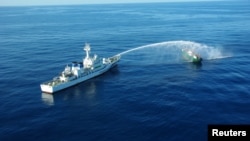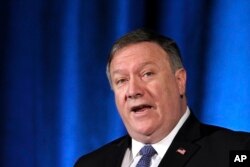Japan said on Tuesday North Korea still posed a dire threat to its security despite a halt to ballistic missile tests and a pledge by leader Kim Jong Un to denuclearize the Korean peninsula.
"North Korea's military activities pose the most serious and pressing threat our nation has faced," said an annual white paper published on Tuesday by Japan's Ministry of Defense.
The document outlines security concerns about nuclear-armed North Korea, China's growing military might and territorial ambitions, and Russia's intent to rebuild its power that paint a picture of Japan surrounded by potential adversaries in East Asia.
The latest security assessment also comes after U.S. President Donald Trump abruptly cancelled a planned fourth trip by Secretary of State Mike Pompeo to Pyongyang this week as part of a fresh bid to push North Korea to abandon nuclear weapons and ballistic missiles following the unprecedented summit between Trump and Kim in Singapore in June.
Trump hailed his meeting with Kim as a success and agreed to halt joint military exercises with South Korea. The North Korean leader reiterated an earlier pledge to work towards removing nuclear weapons from the Korean peninsula.
However, negotiations have since ground to a halt with Washington demanding tangible steps and Pyongyang asking for U.S. concessions first.
Japanese Prime Minister Shinzo Abe has said since the Singapore meeting that his country would not change its military stance towards its belligerent neighbor until it saw concrete, irreversible and verifiable steps towards disarmament.
"We need to keep a careful watch on North Korea to see what concrete action it takes to abandon its nuclear weapons and missiles," the Japanese defense paper said.
It noted that North Korea had conducted three nuclear tests and fired 40 ballistic missiles since the start of 2016, some of which have passed over Japan.
North Korea has derided Abe's government as a "cult" bent on derailing Pyongyang's diplomatic outreach in recent state media comments. State-run newspapers, which once slammed Trump, have recently switched to praising the U.S. leader.
Japan said last month it planned to buy two Aegis Ashore air defense radar tracking stations from the United States to bolster its defense against North Korean missiles. The equipment, which will be deployed along with interceptor missile batteries, could also be turned against any potential threat from China from 2023 onward.
"As Chinese power grows, its military strength is rapidly burgeoning," the white paper said.







